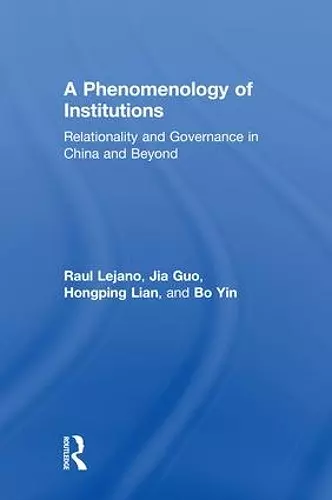A Phenomenology of Institutions
Relationality and Governance in China and Beyond
Raul Lejano author Jia Guo author Hongping Lian author Bo Yin author
Format:Hardback
Publisher:Taylor & Francis Ltd
Published:26th Jul '18
Currently unavailable, and unfortunately no date known when it will be back
This hardback is available in another edition too:
- Paperback£46.99(9781138667365)

To a degree insufficiently captured by the term governance, the present age is one of institutional complexity. China is a case in point. An amalgam of socialist, capitalist, corporatist, and pluralist characteristics, China's systems of governance defy classification using extant categories in the institutionalist literature. What, after all, is a socialist market system?
A Phenomenology of Institutions begins with the problem of describing emergent institutional phenomena using conventional typologies. Constructing a new descriptive framework for rendering new, hybrid, and flexible institutional designs, Raul Lejano, Jia Guo, Hongping Lian, and Bo Yin propose new descriptors, involving concepts of autopoeisis, textuality, and relationality, that might better describe new and emergent models of governance. The authors illustrate the utility of this framework with a number of case studies, each dealing with a different aspect of Chinese legal and civic institutions and comparing these with 'Western' models.
This book will be a valuable resource for institutional scholars in the fields of public policy, political science, organization studies, public administration, and international development, studying new and emergent forms of governance.
'This is a must read book for those interested in the study of institutional diversity and for those who are interested in the evolution of institutions in developing countries particularly China.'- Eduardo Araral, Associate Professor, National University of Singapore
'Lejano, Guo, Lian, and Yin recognize the deficiencies of existing conceptions of institutions, as evidenced by the rapid growth of "democracy with adjectives" scholarship, and rectify this by constructing a framework for new, hybrid, and evolving institutional designs. This framework for analyzing new and emergent models of governance relies on the concept of relationality, rather than rationality in a Weberian tradition, and explains why so many formal institutional designs are only partly specified and the rest is constituted through interactions between networks of policy actors. This is an important and innovative book for institutional scholars to read, as well as those who study Chinese governance.'- Jessica C. Teets, Associate Professor, Middlebury College
ISBN: 9781138667358
Dimensions: unknown
Weight: 340g
150 pages